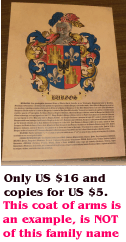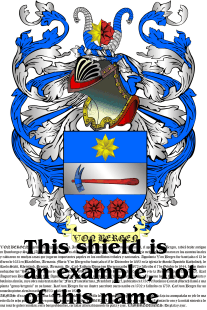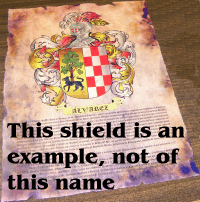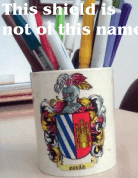
Parchment with the coat of arms, origin and history for the family name Sanda. Very cheap.

Coat of arms for Sanda and the history and origin for the family name Sanda in JPG or Vectorial files as Corel-Draw, AI, WMF, etc.
The family name Sanda appears collected by the Chronicler and King of Arms, Don Vicente de Cadenas y Vicent, in his "Repertoire of Coats of the Hispanic Community", that means that the lineage Sanda has official coat of arms certified by King of Arms. Said Repertoire of Blazons of the Hispanic Community is the greatest work of Spanish heraldry, where the surnames with his heraldic appears like the family name Sanda arranged alphabetically, with their coats of arms. In this work have included the content of many manuscripts of the National Library of Madrid and corresponding to Minutes of Kings of Arms and collects surnames that as Sanda are Spanish or very linked for some reason or other to Spain, so those of the family name Sanda are in this position. There are also thousands of heraldic and heraldic shields from several Sections of the National Historical Archive, as well as the Royal Chancery of Valladolid, Salas de los Hijodalgos of Vizcaya, etc. In summary, those of the surname Sanda have made some test of nobility or knightage.
It may be helpful for those with the name Sanda to know that, in the 15th century, hereditary surnames are already more or less consolidated, thanks in part to the obligation (at the initiative of Cisneros) to record births and deaths in parish books. In any case, it is important to know that, especially in rural areas and among the most humble people, the current norm of the hereditary paternal surname is not fixed definitively until the 19th century, topic that should be taken into account if it is applicable to some families of the family name Sanda It is due to spelling errors and of different types that there are different spellings of the same family name, so those of the name Sanda can have graphic variants.
One of the most distinctive qualities of heraldry is the use of a limited palette of colours and patterns, usually referred to as tinctures. These are divided into three categories, known as metals, colours, and furs.
Next we are going to see the meanings of three tinctures:
1) ARGENT (Silver): Purity, Integrity, Obedience, Firmness, Surveillance, Eloquence and Expiration.
2) SABLE: Black color that symbolizes Prudence, Sadness, Rigor, Honesty and Obedience.
3) PURPLE: Justice, Wit, Truth, Greatness, Wisdom and Love; those who wear this color are obliged to defend the Prince defending ecclesiastical people.
Next lets look at the characteristics of some figures that we can find in heraldry and crests:
* PELICAN: The Pelican is a symbol of the Charitable and Pious Lord towards his vassals.
* STAG: The Stag symbolizes Effortless Courage, which draws and recovers energy even on the most adverse occasions.
* LAMB: The Lamb symbolizes the Kings and Leaders who have to sacrifice themselves to the good and care of their subjects; also denotes in the whiteness of fleeces, Qualified Nobility.
* TRIANGLE: The Triangle symbolizes Divine Equality and Perfection.
* SCEPTER: The Scepter represents Dignity.
* FOUNTAIN: The Fountain is a symbol of Philanthropy and Splendidity.
* WOLF: The Wolf is a symbol of a Constant Heart that suffers the calamities of war and siege with generous spirit; but when the time comes to fight in the open field, he fiercely fights, without giving his enemy a barracks.
* TURTLE: The Turtle is one of the most noble figures, being a symbol of the Knight who retires late from combat, facing his enemy until the last moment, trusting in his own strength.
* The family name Sanda appears in the list of last names of Heraldry & Crests so its complete history, crest and coat of arms or heraldic shields can be known on his website: http://www.heraldrycrests.com/
Heraldry for family name Sanda as well as its history is at your disposal here: Heraldry, history, origin, crest and coat of arms of the family name Sanda
Related Words: Sanda family crest | Origin of the name Sanda | Genealogy of the family Sanda | Heraldry of the name Sanda | Coat of arms of Sanda | Genealogy of the Sanda | Origin of the Sanda | Meaning of the name Sanda.

All the information about the surnames that are collected in this web site are based on verified bibliography.
Origin of family name, history and coat of arms/crests

